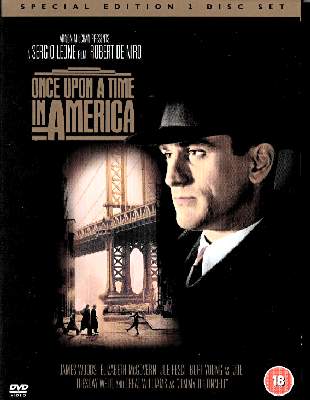DVD Review
Once Upon a Time in America
Music by Ennio Morricone
Starring: Robert De Niro; James Woods; Elizabeth McGovern; Joe Pesci; Tuesday Weld and Treat Williams.
Directed by Sergio Leone
Available on Warner Bros 2 DVD Video ZI 20026
Running Time: 220 mins approx.
Audio: 5.1 Dolby Digital; Aspect Ratio: 1:85:1 Widescreen/Colour
Features: Feature length audio commentary by film critic Richard Schickel; Theatrical Trailer; Documentary Profile 'Once Upon a Time in America: Sergio Leone' Photo Gallery- Rare Behind the Scenes Stills
Amazon UK Amazon US

The release of this DVD of the full 220+-minute version of Once Upon A Time In America, screened as Leone originally intended and not in the ridiculously shortened version that presented the story unsatisfactorily "in chronological order" that was first released in America, allows the chance to fully appreciate the technical mastery of the film; and, on repeat viewings, to fully appreciate the complexity of the story and the relationships of the characters.
The digital colour and audio transfers are first class. The acting is variable. James Woods as the double-crossing Max is excellent. De Niro mumbles his way through and is all meaningful looks and stoical. Elizabeth McGovern is just mechanical.
The film's producer Arnon Milchan, in the DVD documentary reveals how Leone sold him the concept (based on a novel, The Hoods by Harvey Grey) by describing, over 3½ hours, the whole story which even then was in Leone's head and in frame-by-frame detail. Arnon also tells how Leone's brief to Ennio Morricone was so complete that the composer was able to provide the score ahead of the shooting and that much of it was played to the actors on the set. He also reminds us that due to an oversight, Morricone's score was omitted from being put forward for an Oscar nomination. Morricone's music helped immensely to underline the more tender feelings of comradeship that tied 'Noodle's' (Robert de Niro) gang together.
Morricone (or Leone) resisted any attempt to provide darker music for the more violent scenes in this admittedly murky gangster story. James Woods recalls how Leone teased him about that sequence when Woods' character Max is shadowed by the refuse lorry – Did he end up in it? The reply: "It could be you in there or it could not be. We know but we don't know…" Similarly when somebody asked about the enigmatic smile on Noodles' face at the end of the film, Leone reminds that the film begins and ends in the opium den. So was it all a nightmare, a drugged dream?
An uncomfortable film but a technical masterpiece. Worth having to fully appreciate the complexities of this 220+-minute film
Ian Lace
41/2
See also Ian Lace's review of the expanded soundtrack album.
Return to Index